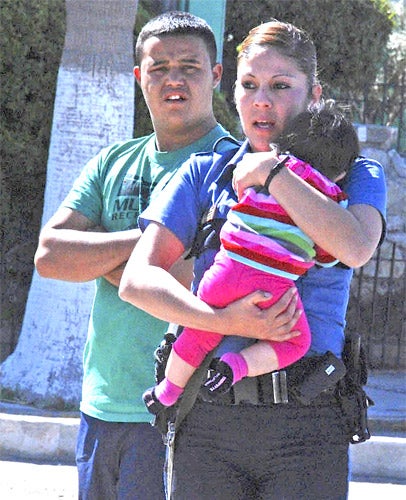Your support helps us to tell the story
From reproductive rights to climate change to Big Tech, The Independent is on the ground when the story is developing. Whether it's investigating the financials of Elon Musk's pro-Trump PAC or producing our latest documentary, 'The A Word', which shines a light on the American women fighting for reproductive rights, we know how important it is to parse out the facts from the messaging.
At such a critical moment in US history, we need reporters on the ground. Your donation allows us to keep sending journalists to speak to both sides of the story.
The Independent is trusted by Americans across the entire political spectrum. And unlike many other quality news outlets, we choose not to lock Americans out of our reporting and analysis with paywalls. We believe quality journalism should be available to everyone, paid for by those who can afford it.
Your support makes all the difference.The murders of three people with ties to a US consulate in Mexico was probably a tragic case of mistaken identity rather than a deliberate attempt to launch an offensive against American officials, the FBI believes.
Initial investigations into the attack, which saw hitmen in balaclavas attack two cars leaving the birthday party of a consular employee's child, suggest the assailants accidentally turned up at the wrong address in the border city of Ciudad Juarez, a bureau spokesman told reporters.
Members of the Juarez drug cartel had been ordered to kill the occupants of two white SUVs attending a different event in the city, on Saturday afternoon, it seems. But they opened fire when they saw similar cars leave a nearby venue.
Lesley Enriquez – a US citizen working at the Juarez consulate – her American husband, Arthur Redelfs, and Jorge Alberto Salcido – the Mexican husband of another consular employee – were shot dead in two separate incidents.
Enriquez, 35, and her 34-year-old husband were killed as they drove their car towards the US side of the border. Their baby was found unharmed in the back seat.
In the second attack, gunmen opened fire on the car belonging to Mr Salcido, killing him and wounding his two children.
Mr Salcido's wife Hilda is believed to have witnessed the attack as she followed her husband in a different car.
Local news reports said she ran screaming at the gunmen after they opened fire, telling them to stop.
"We don't have any information that these folks were directly targeted because of their employment by the US government or their US citizenship," the FBI's Andrea Simmonds said. She added that detectives are still investigating the backgrounds of the victims.
The comments will calm fears that Mexico's drug cartels, which are battling both their government and each other for control of lucrative cocaine and cannabis-smuggling routes across the US border, have decided to start targeting Americans in their country.
There had been speculation that the criminal gangs, which source most of their firearms from Texas where gun-control laws have been relaxed, might attack US assets in retaliation for the extradition to America of several of the country's most powerful drug barons. But experts now think that unlikely.
"A systematic, nationwide shift to the use of such tactics would work against drug traffickers interests," Allyson Benton, an analyst with the Eurasia Group, told the Associated Press. "It would dramatically raise the level of both Mexican and US governmental involvement in the fight against organised crime."
Ciudad Juarez, which sits immediately across the border from El Paso in Texas, has become one of the western hemisphere's most dangerous cities since Mexico's president, Felipe Calderon, began a crackdown on the drug-smuggling trade three years ago.
More than 2,600 people were murdered there last year, and 500 have died this year, from a population of 1.3 million. Some were killed during battles between the police and criminal gangs; others died during conflict between rival smuggling organisations.

Join our commenting forum
Join thought-provoking conversations, follow other Independent readers and see their replies
Comments